Phil brought along his Dutch-Belgian allied army, and split it for the day into a Dutch army and a Belgian one, to allow us a reasonable representation of a hypothetical battle of the Belgian Revolution of 1830-31. In August 1831 The Dutch invaded the rebellious south, enjoying 2 major victories before the French intervened. Our battle would easily fit as a minor action of the brief campaign, and gave at least a whiff of plausibility to the proceedings.
It occurs to me that at this rate I could rename this blog "Belgium in flames", 3 out of 4 battle reports being set in the poor place. Belgian bashing? never! I quite like the place. Anyhow.
For our other player, Chris, I suspect the closest he'd have been to the Napoleonics before would have been the odd episode of Sharpe; ordinarily a Warhammer 40k player, Chris has over the last year or two shown me a natural tactical aptitude (40k must teach you something, eh? either that or he's a loss to the nation militarily!) . In short he's beaten me at my own game on many occaisions.
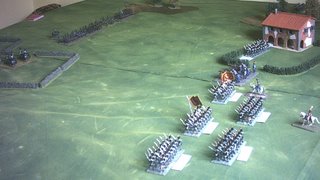
The rules we were using were Piquet, though simplified to a certain extent. Primarily in the way firing was resolved, and some common sense treatments in the morale area. A major aspect of Piquet, is the card driven actions, you may only do what the turned card permits, unless it is a wild card permitting any action. You can fire any time, but if you don't have a reload card you are left vulnerable by doing so.
The other major aspect being that the initiatives are random - each player rolls a 20 sided dice, and the highest roller has the difference between the two results to spend on cards and actions.
The first photo, shows my Dutch on the right formed into attack formations in depth. The Belgians are on the left, from this angle they look heavily outnumbered, but Chris favoured his own right with a larger infantry force, and a fearsome number of cavalry.
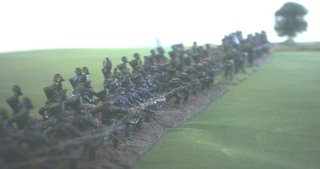
The Belgian front line.
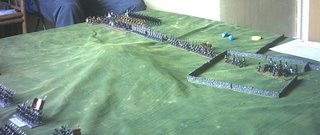
The Belgian Right.
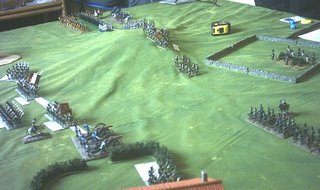 Most of the Early initiative went Chris' way, an inevitable aspect of the rules being that whilst over the course of a game the number of turns will tend to average out, they can tend to form large blocks of action for one side over another. Chris got clean to the bottom of his deck of 40 cards, before I'd turned 8 of mine. This notionally ends the turn and prompts a reshuffle. Which Chris' deck clearly needed!
Most of the Early initiative went Chris' way, an inevitable aspect of the rules being that whilst over the course of a game the number of turns will tend to average out, they can tend to form large blocks of action for one side over another. Chris got clean to the bottom of his deck of 40 cards, before I'd turned 8 of mine. This notionally ends the turn and prompts a reshuffle. Which Chris' deck clearly needed!In terms of action, after an opening redeployment of my artillery, some cannonade and a cavalry advance, it all swung to the Belgians Who began a general advance and summarily fought off my smaller cavalry force on my left. The rest of the game that flank revolved around how long I could keep his horse tied up without losing mine.
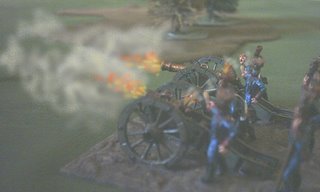 Dutch artillery on the right enfiladed the advancing Belgians. A devastating volley all but wiped out one of his battalions, routing the survivors. This spurred the Dutch right, now on the ascendent into action.
Dutch artillery on the right enfiladed the advancing Belgians. A devastating volley all but wiped out one of his battalions, routing the survivors. This spurred the Dutch right, now on the ascendent into action.With adequate initiative I began an advance. My right was strong, and his looked distinctly rattled.
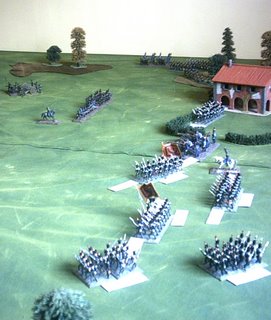
Meanwhile my centre had become all the more defensive, forming squares in light of a possible threat from Belgian cavalry.
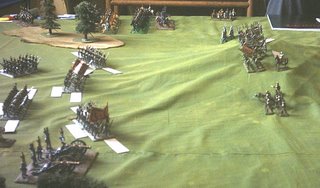
On my right I attempted to charge down his exposed artillery and out flank his weakened left. But thanks to the permitted interrupt actions - few in number but critical if timed well - Chris was able to hammer my troops with grapeshot as they charged home.
It cost me one battalion wholesale, and another routed (though quickly rallied). I cursed my bad luck, having known I'd suffer losses going in, but to get fired on at point blank three times before falling back inches from the guns was miserable luck.
Cheers of "For dark chocolate, Monksbier and mayonaise on our chips" went up from the Elated Belgians.
Initiative began to swing back to the Belgians who bore down on my vulnerable cavalry, clambered over the steep hill in the centre, and consolidated their left.

The Belgians begin to form a thin Black line.
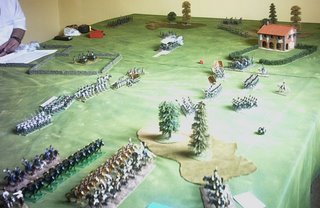
Chris' cavalry charged mine, but Initiative fell with me for the end of the game. I ignored meelee resolution cards in my own hand, and he failed to draw any. I advanced on the right again using massed musketry and artillery to pound his infantry before closing. Time ran out for both of us.
A consultation of the morale chips and losses showed casualties were pretty similar, but the Belgian morale was stronger; although they'd not seized the field, they were the one who could better lay claim to the ground at the end of the day. We agreed it was the very narrowest of Belgian victories.
Piquet worked better than I remembered, though granted Phil, who stuck to umpiring, had simplified the mechanics a fair bit. Napoleonics is a period I always liked for the splendour (few wargamers don't I find) but found the prospect of painting the 4-600 figures my old club's preferred rules (In the Grand Manner) required used, to be both financially and ability wise, beyond me; and the rules themselves require an accountancy qualification to use. Here we both had forces of about 150 foot and 16 to 32 cavalry, with a few guns and got a good game out of it. My great weakness for figures leaves me watching a few painted units on ebay now.
Clearly the sign of a good, enjoyable game!





No comments:
Post a Comment